- Home
- Margaret Atwood
Dearly
Dearly Read online
Publisher’s Note
Rendering poetry in a digital format presents several challenges, just as its many forms continue to challenge the conventions of print. In print, however, a poem takes place within the static confines of a page, hewing as close as possible to the poet’s intent, whether it’s Walt Whitman’s lines stretching to the margin like Route 66, or Robert Creeley’s lines descending the page like a string tie. The printed poem has a physical shape, one defined by the negative space that surrounds it—a space that is crafted by the broken lines of the poem. The line, as vital a formal and critical component of the form of a poem as metaphor, creates rhythm, timing, proportion, drama, meaning, tension, and so on.
Reading poetry on a small device will not always deliver line breaks as the poet intended—with the pressure the horizontal line brings to a poem, rather than the completion of the grammatical unit. The line, intended as a formal and critical component of the form of the poem, has been corrupted by breaking it where it was not meant to break, interrupting a number of important elements of the poetic structure—rhythm, timing, proportion, drama, meaning, and so on. It’s a little like a tightrope walker running out of rope before reaching the other side.
There are limits to what can be done with long lines on digital screens. At some point, a line must break. If it has to break more than once or twice, it is no longer a poetic line, with the integrity that lineation demands. On smaller devices with enlarged type, a line break may not appear where its author intended, interrupting the unit of the line and its importance in the poem’s structure.
We attempt to accommodate long lines with a hanging indent—similar in fashion to the way Whitman’s lines were treated in books whose margins could not honor his discursive length. On your screen, a long line will break according to the space available, with the remainder of the line wrapping at an indent. This allows readers to retain control over the appearance of text on any device, while also indicating where the author intended the line to break.
This may not be a perfect solution, as some readers initially may be confused. We have to accept, however, that we are creating poetry e-books in a world that is imperfect for them—and we understand that to some degree the line may be compromised. Despite this, we’ve attempted to protect the integrity of the line, thus allowing readers of poetry to travel fully stocked with the poetry that needs to be with them.
—Dan Halpern, Publisher
Dedication
For Graeme, in absentia
Contents
Cover
Title Page
Publisher’s Note
Dedication
I.
Late Poems
Ghost Cat
Salt
Passports
Blizzard
Coconut
Souvenirs
The Tin Woodwoman Gets a Massage
If There Were No Emptiness
II.
Health Class (1953)
A Genre Painting
Princess Clothing
Cicadas
Double-Entry Slug Sex
Everyone Else’s Sex Life
Betrayal
Frida Kahlo, San Miguel, Ash Wednesday
Cassandra Considers Declining the Gift
Shadow
Songs for Murdered Sisters
1. Empty Chair
2. Enchantment
3. Anger
4. Dream
5. Bird Soul
6. Lost
7. Rage
Coda: Song
The Dear Ones
Digging Up the Scythians
III.
September Mushrooms
Carving the Jacks
A Drone Scans the Wreckage
Aflame
Update on Werewolves
Zombie
The Aliens Arrive
Siren Brooding on Her Eggs
Spider Signatures
At the Translation Conference
IV.
Walking in the Madman’s Wood
Feather
Fatal Light Awareness
Fear of Birds
Short Takes on Wolves
Table Settings
Improvisation on a First Line by Yeats
“Heart of the Arctic”
Plasticene Suite
1. Rock-like Object on Beach
2. Faint Hopes
3. Foliage
4. Midway Island Albatross
5. Editorial Notes
6. Sorcerer’s Apprentice
7. Whales
8. Little Robot
9. The Bright Side
Tracking the Rain
Oh Children
The Twilight of the Gods
This Fiord Looks Like a Lake
V.
One Day
Sad Utensils
Winter Vacations
Hayfoot
Mr. Lionheart
Invisible Man
Silver Slippers
Within
Flatline
Disenchanted Corpse
Dearly
Blackberries
Acknowledgements
About the Author
Also by Margaret Atwood
Copyright
About the Publisher
I.
Late Poems
These are the late poems.
Most poems are late
of course: too late,
like a letter sent by a sailor
that arrives after he’s drowned.
Too late to be of help, such letters,
and late poems are similar.
They arrive as if through water.
Whatever it was has happened:
the battle, the sunny day, the moonlit
slipping into lust, the farewell kiss. The poem
washes ashore like flotsam.
Or late, as in late for supper:
all the words cold or eaten.
Scoundrel, plight, and vanquished,
or linger, bide, awhile,
forsaken, wept, forlorn.
Love and joy, even: thrice-gnawed songs.
Rusted spells. Worn choruses.
It’s late, it’s very late;
too late for dancing.
Still, sing what you can.
Turn up the light: sing on,
sing: On.
Ghost Cat
Cats suffer from dementia too. Did you know that?
Ours did. Not the black one, smart enough
to be neurotic and evade the vet.
The other one, the furrier’s muff, the piece of fluff.
She’d writhe around on the sidewalk
for chance pedestrians, whisker
their trousers, though not when she started losing
what might have been her mind. She’d prowl the night
kitchen, taking a bite
from a tomato here, a ripe peach there,
a crumpet, a softening pear.
He reappears
You rose from a snowbank
with three heads, all
your hands were in your pockets
I said, haven’t
I seen you somewhere before
You pretended you were hungry
I offered you sandwiches and gingerale
but you refused
Your six eyes glowed
red, you shivered cunningly
Can’t we
be friends I said;
you didn’t answer.
You take my hand and
I’m suddenly in a bad movie,
it goes on and on and
why am I fascinated
We waltz in slow motion
through an air stale with aphorisms
we meet behind endless potted palms
> you climb through the wrong windows
Other people are leaving
but I always stay till the end
I paid my money, I
want to see what happens.
In chance bathtubs I have to
peel you off me
in the form of smoke and melted
celluloid
Have to face it I’m
finally an addict,
the smell of popcorn and worn plush
lingers for weeks
She considers evading him
I can change myself
more easily
than I can change you
I could grow bark and
become a shrub
or switch back in time
to the woman image left
in cave rubble, the drowned
stomach bulbed with fertility,
face a tiny bead, a
lump, queen of the termites
or (better) speed myself up,
disguise myself in the knuckles
and purple-veined veils of old ladies,
become arthritic and genteel
or one twist further:
collapse across your
bed clutching my heart
and pull the nostalgic sheet up over
my waxed farewell smile
which would be inconvenient
but final.
They eat out
In restaurants we argue
over which of us will pay for your funeral
though the real question is
whether or not I will make you immortal.
At the moment only I
can do it and so
I raise the magic fork
over the plate of beef fried rice
and plunge it into your heart.
There is a faint pop, a sizzle
and through your own split head
you rise up glowing;
the ceiling opens
a voice sings Love Is A Many
Splendoured Thing
you hang suspended above the city
in blue tights and a red cape,
your eyes flashing in unison.
The other diners regard you
some with awe, some only with boredom:
they cannot decide if you are a new weapon
or only a new advertisement.
As for me, I continue eating;
I liked you better the way you were,
but you were always ambitious.
After the agony in the guest
bedroom, you lying by the
overturned bed
your face uplifted, neck propped
against the windowsill, my arm
under you, cold moon
shining down through the window
wine mist rising
around you, an almost-
visible halo
You say, Do you
love me, do you love me
I answer you:
I stretch your arms out
one to either side,
your head slumps forward.
Later I take you home
in a taxi, and you
are sick in the bathtub.
My beautiful wooden leader
with your heartful of medals
made of wood, fixing it
each time so you almost win,
you long to be bandaged
before you have been cut.
My love for you is the love
of one statue for another: tensed
and static. General, you enlist
my body in your heroic
struggle to become real:
though you promise bronze rescues
you hold me by the left ankle
so that my head brushes the ground,
my eyes are blinded,
my hair fills with white ribbons.
There are hordes of me now, alike
and paralyzed, we follow you
scattering floral tributes
under your hooves.
Magnificent on your wooden horse
you point with your fringed hand;
the sun sets, and the people all
ride off in the other direction.
He is a strange biological phenomenon
Like eggs and snails you have a shell
You are widespread
and bad for the garden,
hard to eradicate
Scavenger, you feed
only on dead meat:
Your flesh by now
is pure protein,
smooth as gelatin
or the slick bellies of leeches
You are sinuous and without bones
Your tongue leaves tiny scars
the ashy texture of mildewed flowers
You thrive on smoke; you have
no chlorophyll; you move
from place to place like a disease
Like mushrooms you live in closets
and come out only at night.
You want to go back
to where the sky was inside us
animals ran through us, our hands
blessed and killed according to our
wisdom, death
made real blood come out
But face it, we have been
improved, our heads float
several inches above our necks
moored to us by
rubber tubes and filled with
clever bubbles,
our bodies
are populated with billions
of soft pink numbers
multiplying and analyzing
themselves, perfecting
their own demands, no trouble to anyone.
I love you by
sections and when you work.
Do you want to be illiterate?
This is the way it is, get used to it.
Their attitudes differ
1
To understand
each other: anything
but that, & to avoid it
I will suspend my search for
germs if you will keep
your fingers off the microfilm
hidden inside my skin
2
I approach this love
like a biologist
pulling on my rubber
gloves & white labcoat
You flee from it
like an escaped political
prisoner, and no wonder
3
You held out your hand
I took your fingerprints
You asked for love
I gave you only descriptions
Please die I said
so I can write about it
They travel by air
A different room, this month
a worse one, where your
body with head
attached and my head with
body attached coincide briefly
I want questions and you want
only answers, but the building
is warming up, there is not much
time and time is not
fast enough for us any
more, the building sweeps
away, we are off course, we
separate, we hurtle towards each other
at the speed of sound, everything roars
we collide sightlessly and
fall, the pieces of us
mixed as disaster
and hit the pavement of this room
in a blur of silver fragments
not the shore but an aquarium
filled with exhausted water and warm
seaweed
glass clouded
with dust and algae
tray
with the remains of dinner
smells of salt carcasses and uneaten shells
sunheat comes from wall
grating no breeze
you sprawl across
the bed like a marooned
starfish
you are sand-
coloured
on my back
your hand floats belly up
You have made your escape,
your known addresses
crumple in the wind, the city
unfreezes with relief
traffic shifts back
to its routines, the swollen
buildings return to
normal, I walk believably
from house to store, nothing
remembers you but the bruises
on my thighs and the inside of my skull.
Because you are never here
but always there, I forget
not you but what you look like
You drift down the street
in the rain, your face
dissolving, changing shape, the colours
running together
My walls absorb
you, breathe you forth
again, you resume
yourself, I do not recognize you
You rest on the bed
watching me watching
you, we will never know
each other any better
than we do now
Imperialist, keep off
the trees I said.
No use: you walk backwards,
admiring your own footprints.
After all you are quite
ordinary: 2 arms 2 legs
a head, a reasonable
body, toes & fingers, a few
eccentricities, a few honesties
but not too many, too many
postponements & regrets but
you’ll adjust to it, meeting
deadlines and other
people, pretending to love
the wrong woman some of the

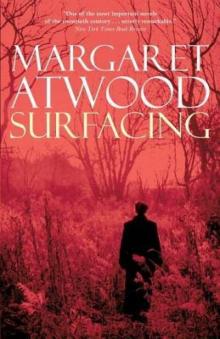 Surfacing
Surfacing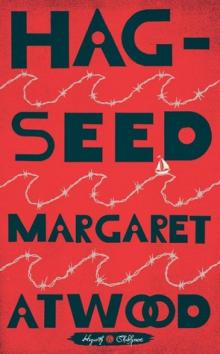 Hag-Seed
Hag-Seed Oryx and Crake
Oryx and Crake The Heart Goes Last
The Heart Goes Last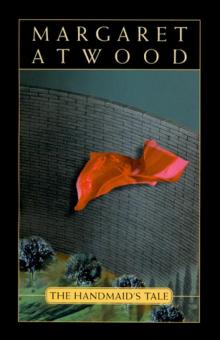 The Handmaid's Tale
The Handmaid's Tale Lady Oracle
Lady Oracle Good Bones and Simple Murders
Good Bones and Simple Murders The Robber Bride
The Robber Bride Life Before Man
Life Before Man Alias Grace
Alias Grace The Blind Assassin
The Blind Assassin Cat's Eye
Cat's Eye The Testaments
The Testaments The Penelopiad
The Penelopiad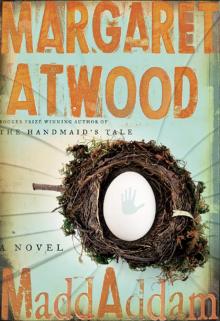 MaddAddam
MaddAddam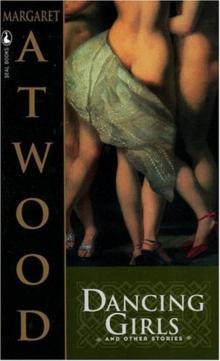 Dancing Girls & Other Stories
Dancing Girls & Other Stories On Writers and Writing
On Writers and Writing Selected Poems II (1976-1986)
Selected Poems II (1976-1986) Wilderness Tips
Wilderness Tips Dearly
Dearly The Tent
The Tent Bluebeard's Egg
Bluebeard's Egg The Edible Woman
The Edible Woman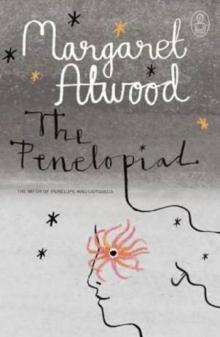 The Penelopiad: The Myth of Penelope and Odysseus
The Penelopiad: The Myth of Penelope and Odysseus Good Bones
Good Bones I Dream of Zenia with the Bright Red Teeth
I Dream of Zenia with the Bright Red Teeth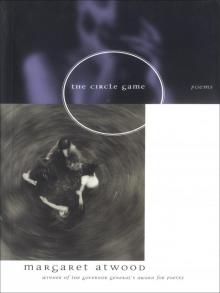 Circle Game
Circle Game Choke Collar: Positron, Episode Two
Choke Collar: Positron, Episode Two Stone Mattress: Nine Tales
Stone Mattress: Nine Tales The MaddAddam Trilogy
The MaddAddam Trilogy Stone Mattress
Stone Mattress Power Politics
Power Politics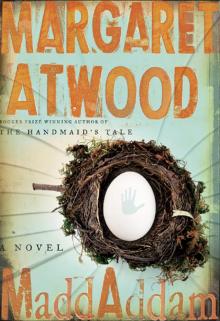 MaddAddam 03 - MaddAddam
MaddAddam 03 - MaddAddam I’m Starved for You (Kindle Single)
I’m Starved for You (Kindle Single) Murder in the Dark
Murder in the Dark In Other Worlds
In Other Worlds Dancing Girls
Dancing Girls Moral Disorder
Moral Disorder